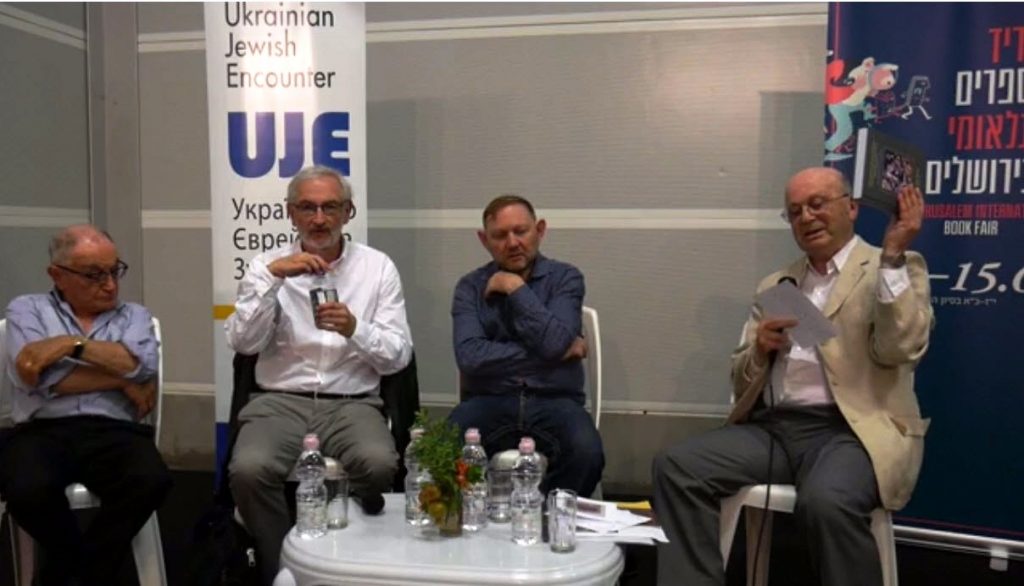Ukrainians and Jews: To look at one another in order to better understand ourselves

The 2017 Jerusalem International Book Fair featured not only the presentation of new books published with the support of the Ukrainian Jewish Encounter, but also a panel discussion on a wide range of issues in Ukrainian-Jewish relations in history and the present day.
The participants in the presentation and discussion included Shimon Redlich, Sergey Kravtsov, Ze'ev Khanin, and Wolf Moskovich. Mordechai Altshuler, the renowned historian of Eastern European Jewry, was also present in the hall.
Dr. Sergey Kravtsov from the Center for Jewish Art at the Hebrew University of Jerusalem noted the book The Ukrainian Jewish Encounter: Cultural Dimensions became the “real fruit of a meeting of intellectuals of both nations."
Hebrew University Emeritus Professor Wolf Moskovich added, "This book became the result of a conference of academics who studied interactions in languages, songs, architecture, and the fine arts." He also referred to a booklet about the interactions of Ukrainians and Jews even in the kitchen—in culinary traditions, names, and recipes.
Professor Moskovich also remarked upon the role of the UJE project connected with the town of Buchach in Western Ukraine. Three contemporary Ukrainian writers studied the town’s heritage of Jewish life during of the times of native son Shmuel Agnon, and have produced a book inspired by this experience.
Professor Ze'ev Khanin, Chief Scientist of the Israel Ministry of Immigration and Absorption and Professor of Political Science at Ariel and Bar-Ilan Universities, emphasized that the word "encounter" in the name of the UJE means not only a meeting, but also an understanding between two peoples.
"This organization was created in 2008 for an improvement in the mutual understanding between Ukrainians and Jews. I am very grateful to this organization and to Professor Moskovich for their huge contribution to such a mutual understanding," said Professor Khanin.
Remarks from Professor Ze'ev Khanin's speech:
"We see a dual process over the last twenty to twenty-five years:
One, in Israel there has been a joint integration of repatriates from Ukraine, Russia, and other republics of the ex-USSR into one "Russian Israel." Through the principle of postmodernism, there is emerging in the Israeli Jewish collective identification the view that "I am Israeli plus something else," with an emphasis on some sub-ethnic group.
Two, however, in Ukraine and other independent countries of ex-USSR we see an opposite tendency—the formation of Ukrainian Jewry for example."
"Contemporary Ukrainians try to study the experience of Jews and Israelis, to look at another, in order to better understand themselves.
There is a need not only for books about the heritage of Jews of Ukraine for Jewish education, but also books for Ukrainian schools on this subject.
The Ukrainian intellectual elite understands there is a need not only to understand facts that divide us, but also those that can unite our people in the future. The general past of the two peoples immerses us in disputes over who is guiltier and more right. It is Important not only to study the past, but also to analyze what from the past is better to use for the future.
The national-liberal intellectuals in Ukraine have understood they have to pay a price for their independence, as has Israel. Ukrainians are reflecting on how to navigate priorities among security issues and the development of civil society and social needs. We see a huge interest in Ukraine in the Israeli experience."
Excerpts from Professor Shimon Redlich's speech:
"Jews have retained images of a very difficult past (in Ukraine). As for me, it has taken time to get accustomed to the trident (Ukrainian national symbol—Ed.) because in my mind the trident was associated with bad and unpleasant affairs.
If we however plunge deeply only into the topics of Khmelnytsky, Petliura, and Bandera, then we will never come to something constructive for the future.
Regarding the question of heroes for Ukraine. On the one hand, there was the bitter struggle of the UPA [Ukrainian Insurgent Army—Ed.] against Soviet power in 1944-1947. But there were also millions of Ukrainians who fought in the Red Army and defeated Hitler. The Ukrainian elite has to focus on national heroes who are positive from the point of view of humanity and morals. I finish each speech with a phrase like "Carthage must be destroyed." It is necessary to highly appreciate Metropolitan Sheptytsky.
Ukraine should follow the example of Poland in the sphere of dialogue between Poles and Jews. I hope there will be such a dialogue in the near future between Ukrainians and Jews. If pro-European, liberal, more open and less extreme nationalist tendencies win in Ukraine, then there is a chance for such a dialogue. But if another tendency wins, it will be very difficult for all of us."
Watch a video of the panel discussion at the Jerusalem International Book Fair (in Hebrew).



















